Columns
How the COPE dope on bond probe put just governance back on track
View(s):The sky may have fallen on the bond issue bounty but somehow the Yahapalana sun peeps through
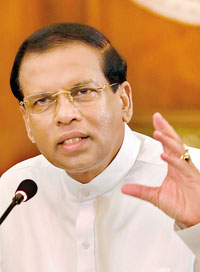
PRESIDENT: Directs matter to the judicial process
Suddenly the sky seems to have fallen down on the fortunes of Perpetual Treasuries; and the garden where the company basked in the year-long summer sunshine amid 5 billion roses, has now been buried in darkness, its future fate swallowed up in uncertainty.
 The monitoring committee of this other Eden, where only the chosen few could tread and which was once considered off limits to inspectors, has unearthed startling evidence that has taken the sheen off Perpetual’s achievements and brusquely wiped the smirk of triumph off its ruddy face. The watchdogs have discovered that the supposedly fertile soil may have contained a banned substance which may have contributed to bloom Perpetual Treasuries’ award winning prized roses.
The monitoring committee of this other Eden, where only the chosen few could tread and which was once considered off limits to inspectors, has unearthed startling evidence that has taken the sheen off Perpetual’s achievements and brusquely wiped the smirk of triumph off its ruddy face. The watchdogs have discovered that the supposedly fertile soil may have contained a banned substance which may have contributed to bloom Perpetual Treasuries’ award winning prized roses.
Last Friday’s damning COPE report revealed how the 2015 Central Bank bond issue had made one primary dealer, Perpetual Treasuries, record an unprecedented profit of over Rs. 5 billion and transformed the newly formed company, not even three years in existence, to an enfant terrible in the creative art of turning copper to gold or to conjure out from an investment of some still unquantified billions a neat 5 billion buck profit overnight.
The COPE report implied the secret of this modern day alchemy may lie in the personal bond that existed between Arjuna Mahendran who happened to be the Governor of the Central Bank and his son in law who happens to be the owner, though not a director, of Perpetual Treasuries Ltd.

PRIME MINISTER: Report absolves him of any blame
Not that this obvious conflict of interest went unnoticed by the parties concerned. Nor did it go amiss that it would be a bar to Mahendran’s appointment as the Governor of the Central Bank. And, thus, in a seeming gesture of sacrifice, Arjun Aloysius demonstrated that greater love hath no man than this, that he should lay down his directorship for his father in law’s career advancement to the country’s top most banking post. A few days before the appointment of Mahendran as the Government’s banker was announced, his son in law dutifully and discreetly resigned from the Board of Directors of Perpetual Treasuries which his family owns and which his father is chairman of.
But it cut no dice when the bond scandal broke. The rival primary dealers cried foul. The joint opposition yelled fraud. The people were appalled to find the Yahapalanaya sun eclipsed so early in its dawn. And when the prime minister appointed a three member committee to probe the alleged scam, their findings were met with scorn.
The issue then and the issue now is not whether Mahendran and his son-in-law were involved in any dubious dealing. That is for a court of law to determine. The issue was and still is whether the nexus between the two gave rise to a conflict of interest that vitiated against the declared principles of Yahapalanaya which was the bedrock of this government; and whether it revolted moral and business ethics.
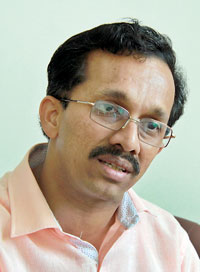
HANDUNETTI: Steers report as Chairman
Ultimately to abate the growing storm, the matter was directed to the Committee on Public Enterprises, comprising 26 members of parliament. Not that it was a body packed to the brim with men famed for their moral rectitude but, given the dire straits the country is in where no single party, not even the joint opposition, can lay claim to a monopoly on corruption, it had to do.
Last week, however, when COPE‚Äôs chairman JVP‚Äôs Sunil Handunnetti issued the committee‚Äôs long awaited report — a report that had undergone many pangs of labour before its caesarian birth — it laid to rest public fears that the foetus would see the light of day deformed, if at all.
Despite some reported attempts to carpet the fallout or make grotesque its findings and shape the clay of evidence in one’s own vested interest, Handunetti’s stance and perseverance to deliver untarnished the report expected of him by the people; and the Auditor General’s brave refusal to be cowed down by those who wished to put their own imprimatur upon it so it would not be tantamount to party blasphemy, served, and succeeded against the odds, to present to Parliament a generally acceptable and fair account of the events surrounding the scandal of the decade and to lay the blame where it should fall in their considered opinion.
Above all it confirmed the public’s first and worst suspicion: that there was something rotten in the state of the Treasury bond system as it has been practised for years without a single eyebrow raised.
To put it briefly the COPE report had this to say in the main:
- That the former Governor of the Central Bank, Arjuna Mahendran, is directly responsible for the Bond Issue and that there is a reasonable doubt that the former Governor of the Central Bank interfered in this process.
- That legal action should be instituted against Arjuna Mahendran and all other Central Bank officials responsible for the issue.
- That one primary dealer, namely, Perpetual Treasuries, was able to earn a large profit through the bond transactions that took place during the period.
- That investigation should be conducted into the manner in which Perpetual Treasuries earned a massive profit within a short period of time.
- That action should be taken to reclaim from the responsible persons the loss or damages caused to the state and the people.
- That judicial action must be taken against these offences
- That it is Parliament’s responsibility to ensure that the Government recovered the losses they incurred.
- That there is reasonable doubt, that lack of transparency and the manner in which the transaction was conducted resulted in a betrayal of the trust placed in the Central Bank.
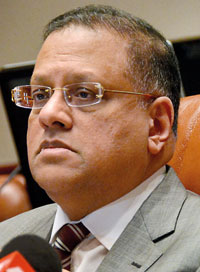
MAHENDRAN: Held responsible
For the joint opposition, Christmas has arrived early; and they find the Christmas turkey stuffed with a cause célèbre they can feed on for weeks on end. They have announced their plans to draw the good name of the political Holy Ghost in vain as the credited architect of the whole grand bond design and hold a series of countrywide protests demanding the prime minister to resign. But they forget one factor. The Governor of the Central bank, once he is appointed, is for all practical purposes, a loose missile, beyond governmental control once launched, beyond the reach of the Government’s destruct button.
True, it was the Prime Minister who appointed Mahendran but after the appointment is made and Mahendran sits on his governor‚Äôs chair, only Parliament has the right to make him rise from his seat during his predetermined tenure of office. As Minister Rajitha Senaratne pointed out on Wednesday, the COPE report does not place any blame on the Prime Minister and that ‚Äúits Chairman Sunil Handunnetti had in fact clearly stated that if they had conducted the auction as the Prime Minister had instructed, this problem would not have arisen.‚ÄĚ If the prime minister is to be a fit subject for attack, it is only in his questionable judgment to have appointed Mahendran in the first instance, his judgment only now called into question with the benefit of hindsight.
Secondly it must be noted that neither Arjuna Mahendran nor his son-in-law has been arraigned before any court let alone convicted. Rather ironic, isn’t it then, that the joint opposition which calls the anti-corruption crackdown a political witch hunt and insist upon their innocence since no court has still convicted them, should now rush to condemn and convict not only Mahendran and his son-in-law but the Prime Minister as well and yet maintain that their planned safari is not a political witch-hunt targeted solely against the premier?
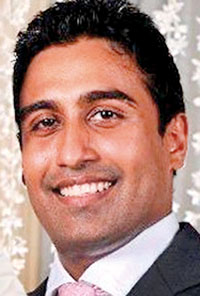
ALOYSIOUS: Perpetual Treasuries
The Joint Opposition this week also filed a complaint at the Bribery Commission against Prime Minister Wickremesinghe and Mahendran over the Central Bank bond issue. The Prime Minister responded swiftly by stating ‚ÄúIf I am to appear before the Bribery Commission regarding the Central Bank bond issue, I will gladly do that.”
The Cabinet too has taken a unanimous decision to stand by the Prime Minister against the allegation that he too was involved in the bond issue, Cabinet spokesman Minister Senaratne announced and, for the first time revealed why Ranil Wickremesinghe had appointed Mahendran to the Governor‚Äôs chair. ‚ÄúHe was appointed because of the credibility of his father Charlie Mahendran who was a diplomat and long-term UNP supporter but that would not stop the Government from continuing with investigations,‚ÄĚ the
Minister said.
But it is not the appointment itself that shocked the nation but the patent presence of a glaring conflict of interest that surrounded the February 2015 bond transaction when it transpired that the son-in-law had made hay while his father-in-law’s sun shone at the Central Bank.
On January 29th last year, the new Government appointed Arjuna Mahendran as the Governor of the Central Bank to preside over the nation‚Äôs monetary affairs. His main qualifications for the top job were his previous positions as the Head of Investment Strategy ‚Äď Asia at HSBC Private Bank and the CEO of Wealth Management Division at Emirates NBD Bank. His main promoter was none other than the new Prime Minister Ranil Wickremesinghe. His credentials were in order. And not even the Rajapaksa opposition could fault his appointment. As far as the public were concerned, incorruptible, honest-to-goodness Ranil Wickremesinghe‚Äôs strong recommendation was a sterling character certificate that placed Mahendran‚Äôs moral fibre beyond question. But then the
storm broke.
On February 24th the Central Bank advertised the sale of Rs. 1 billion in 30 year government bonds at an indicative rate of 9.5 per cent. On February 26th the Finance Minister announced that the Government required an additional Rs. 15 billion to fund urgent road construction projects. On February 27th the 30-year bond auction for Rs.1 billion was opened with 36 offers received up to Rs. 20 billion. The Central Bank Governor was thus able to accept Rs. 10 billion.
The problem was this new figure, thousand percent more than the original figure, was accepted not in the 9.5 to 10.6 percent range but at the higher yielding rate of 12.5 percent. The scandal that broke out was that, while the other bidders for the original Rs 1 billion had been accepted at the lower rate of 9.5 percent, Perpetual Treasuries offer for Rs 5 billion at the higher rate of 12.5 per cent had been accepted. And Perpetual Treasuries happened to be owned by the son-in-law of the newly appointed Governor of the Central Bank Arjuna Mahendran who to all sense and purpose was the master of ceremonies conducting the Rs 10 billion bond auction.
The question buzzing in the market on Monday, March 2nd when the primary market opened was whether Arjuna Mahendran’s son-in-law’s company had benefitted from the bond issue because of family ties?
It was this that caused the stench. This that made the Yahapalana sun stand eclipsed. Exactly on the 50th day of the 100 day programme designed and dedicated to turn the Rajapaksa tide of corruption, serious doubts were cast whether the Yahapalana promise of good governance was writ on shifting sands; and whether the newly whitewashed pillars of transparency and accountability had been indelibly tarred to blacken the shine and splendour of the new Yahapalana dawn. Was the promised new edifice to be nothing more than a sand castle on a torrid beach, vulnerable to all the raging waves of vice the previous regime was accused of setting in motion, and which ultimately brought about its downfall?
Thankfully such a fate has still not come to pass. Though Yahapalanaya dipped in the public esteem following the bond issue, it has now been safely dragged from the brink of extinction, since the COPE report saw light, albeit after laboured birth. If faith had been shaken it had not been shattered.
During the run-up to the release date of the COPE report, news abounded with attendant criticism of the various attempts by the UNP members on the committee to ride roughshod over the rest and even question the Auditor General on his report in an unbecoming manner. But, in a vibrant democracy, isn’t that the normal natural thrust and parry of political swordsmen fencing to defend their interests? Anything startling about that? Especially when their alleged acts did not succeed in preventing COPE from issuing the report it did? Isn’t that another feather in the Yahapalana cap where the people’s right to know triumphed over party politics?
If not for Yahapalanaya would the Auditor General dared have stood his ground in the face of the ruling party’s persistence to have their way? Today he has been emboldened, his spine fortified to withstand such pressure thanks to his department made an independent body once again under the 19th Amendment which President Sirisena introduced in April to foster just governance last year, repealing the draconian 18th amendment Rajapaksa brought to strengthen his hold on every facet of democratic life to the applause of a misguided public drunk with war victory.
As a result of the Yahapalana policies the alleged machinations of the ruling UNP failed. Had this controversy erupted during the last regime, can you imagine that the protests of Rajapaksa acolytes would be reduced to mere footnotes in a COPE report, as happened in this instance with the dissenting UNP members? There would have been no report at all, save a whitewashing act.
And now see what has happened. A Pandora’s Box of assortments has been opened as a result of the COPE report. And everything that has flown out of it so far has confirmed the existence of democracy in the making in Lanka. For democracy is not instant nor is it stagnant like dictatorships often are but evolve from the cacophony of diverse voices and gains its strength from a people’s resilience to withstand its many upheavals. In order to survive, sometimes it perforce must assume a chameleon nature. Consider the following, when those who came to scoff remained to pray for more?
For instance, from a position of retreat, it spurred the charge of the UNP strike brigade. If the pre-COPE report had made the UNP members knights of rusting armour in the defence of Mahendran, the post-COPE report turned them to knights with shining swords to attack the COPE report itself for not having gone far enough to impale Mahendran and his son-in-law upon the spike of criminal law.
UNP member of COPE, Ajith P. Perera who it was alleged had berated the Auditor General for assuming the status of the Enlightened Buddha or the divinity of the gods, now bemoans that the recommendation he made to the COPE committee that Mahendran and son-in-law be criminally investigated had not been included in the final COPE report. He told the media this week, ‚ÄúI proposed that a criminal investigation should be initiated and all the members of the director board of Perpetual Treasuries and its holding company should be separately questioned. But, surprisingly, Handunnetti did not agree with it. He walked out of the meeting in protest. Other members of the COPE endorsed my proposal.‚ÄĚ
He is backed by his UNP colleague Harsha de Silva who says: ‚ÄĚ The 15 recommendations of the final report could have been much tougher if the recommendation to investigate the company ‚ÄėPerpetual treasuries‚Äô and its current and ex-Director Board had been
included in the report. “
The COPE report has also borne fruit in other ways. Its call for the Central Bank to implement rigorous mechanisms that will ensure the non-recurrence of such incidents has already prompted the new Governor Dr. Coomaraswamy to seek assistance from the World Bank and International Monetary Fund for a fool proof system to thwart ‚Äėbond scams‚Äô in future. ‚ÄúThis is to put a check on future would be ‚ÄėBond scams‚Äô and introduce a system that will be difficult to manipulate,‚ÄĚ he said on Tuesday.
The Prime Minister Ranil Wickremesinghe whose strength is the strength of ten and the whole of Parliament put together because his conscience is pure, announced on Wednesday, after the Joint Opposition filed a complaint against him at the Bribery Commission, he is ready to face any inquiry against him. He said: ‚ÄúIf I am to appear before the Bribery Commission regarding the Central Bank bond issue, I will gladly do that.”
And President Sirisena said on Thursday, “I wish to make it clear that I did not leave the past government without forsaking my party and come forward to unite all and form a new government to punish those who committed wrong and to allow another set to do wrong. That is my policy. My policy as regards the Central Bank bond issue which I have not said before is that the investigation into this matter must now proceed without the participation of any politicians. This investigation must now be directed to an impartial judicial process. To show the people that we are clean and pure, I will take legal advice and direct it to the judiciary to give a verdict on the report. “
For twenty months the pall of gloom that had descended that day in February last year doggedly remained to foul the air; and recoiled the spring of hope Yahapalanaya had held for the masses. But if the Rajapaksa rebels revelled in its doom and prophesied an early grave for the Government, despondency would be their sad pottage today when they find it has sprung back to life with vengeance and the Maithripala- Ranil government now stands vindicated.
Though there was considerable disquiet that the COPE report would be tampered with and the UNP would do its worst to ensure a cover up, the contents of the report and its general acceptance by all sides of the political divide as a fair and accurate finding, amply demonstrate that the flame of Yahapalanaya, though subject to many an ill wind, has weathered the storm, and still burns bright to take Lanka from darkness to light.
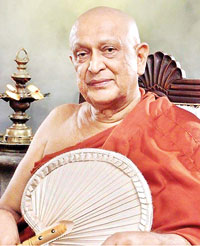 VEN SOBITHA: Moral voice hushed Ven Sobitha‚Äôs first death anniversary ‚ÄĚThere are thousands of reports received by the Bribery Commission during the previous president‚Äôs regime. None of those was investigated. What the president said was that he had files and the culprits should not go against him. Those files were not given for him to take home. They were given to be investigated and punish those who are guilty. What happenedwhen this did not happen? From the top to the lowest level, even and Pradeshiya Sabha level people started taking bribes. This was not done on a minor scale. Bribes were taken in millions. ‚ÄúTherefore please apprehend all those who are connected with corruption and bribes irrespective of their positions or the parties they belong to. Return the money that was robbed from us, commence investigations, we proposed to appoint another bribery commission if one bribery commission is not sufficient. Take quick decisions and show the people who the rouges and who the good people are.‚ÄĚ | |


Leave a Reply
Post Comment